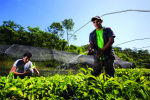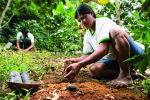Sustainability permeates nearly all aspects of business. In the hospitality industry, it influences choices as diverse as the stationery paper used and what’s on the menu. Building on the success of the group’s Planet 21 programme, Arnaud Herrmann, sustainable development director at AccorHotels, tells Bradford Keen why CSR goals and business strategy need to be intimately acquainted.
Trawling through the company’s archive, Arnaud Herrmann unearthed a prescient sentiment buried in the recent past. It was 1973 and one of AccorHotel’s founders had uttered the weighted words “the environment is the raw material for tourism”.
Over 40 years later, that core belief has shaped much of the legacy for which Herrmann is now responsible as he drives its evolution to meet the demands of a totally new market place. In his role as sustainable development director for Europe’s largest hotel operator, Herrmann defines the global vision and strategy for the group. “I am responsible for instilling energy and dynamism across all functions in all countries to mobilise teams,” he says.
With 4,000 hotels and more than 240,000 employees, it sounds like a monumental task. The scale of the operation and its decentralised organisation are challenging aspects for Herrmann, as is the need to advance goals across multiple levels simultaneously, including hotel implementation, functional support, communication and, ultimately, awareness of the sustainability ethos.
Despite these challenges, Herrmann says he has been pleasantly surprised since leading the charge three years ago. “I was expecting difficulties when trying to convince people to turn to sustainable ways, but this has not been the case.”
Part of this is due to staff being encouraged to participate in the sustainability story and take initiative relevant to their respective employment levels. It is important to note just how wide the sustainability spectrum has spanned since the 1970s. It’s no longer just about reducing carbon footprints and respecting the environment – although that is still a significant factor. “If the beach next to the hotel is dirty, people won’t want to visit and the hotel will be empty,” Herrmann says.
Moving the goalposts
Sustainability goals have widened to include a dedicated and happy workforce, building amenities for the communities from which many staff members come, partnering with suppliers that share sustainability values, helping grow other businesses that promote the ethos of AccorHotels and committing to valuable social initiatives against child abuse through its Solidarity programme.
For staff sustainability, employees get the chance to join management committee meetings once a month, participate in 360° assessments with easier access to senior management, make use of a health and well-being programme, and annualise working hours to set their own schedules. “We want to create momentum among employees,” Herrmann says, “and make sure they adhere to our projects. We encourage them to achieve sustainable action.”
Support from staff is a significant factor to reach sustainability goals, and companies implementing their own programmes would do well to tap into this energetic dynamic in a way that is mutually beneficial. However, while employees play an integral role in advancement, Herrmann says the real success comes from defining sustainability in terms of business. Planet 21, which launched in 2011, is in its second season. Having achieved over 66% of its goals in its first five years, Herrmann is confident the group is on target for 2020.
“Planet 21 has been easy to adapt as it was built in a business-oriented way,” Herrmann says. He has studied the hotels’ business models and aligned them with the group’s CSR goals. “Having formalised the CSR strategy this way, it was very easy to explain why it was a competitive advantage to push sustainability. It is very easy for top management to understand issues of cost on traction, tension and design.
“CSR is a business issue, which makes it a business opportunity as well as a business risk. I think this philosophy of integrating sustainability change into business strategy opens minds to manage the issues because they are seen as a problem in the business world.”
Team player
Not to take too much of the credit, Herrmann says he inherited a successful sustainability strategy when joining the group. “We know the stakes are real and we have to move [forward],” he says. “Also, the context has changed a lot. We know what customers want now; there are economic demands and pressure from civil society, NGOs and politicians for more sustainable business practice.”
Of the first season of Planet 21’s successes – which include a 7.2% reduction in AccorHotels’ energy costs, improvement to waste management, 9.0% reduction in water use between 2011 and 2015, and 97.0% of hotels using eco-labelled goods and 96.0% promoting balanced food dishes – Herrmann regards the creation of awareness as its major victory because the CSR strategy is deeply embedded in the business model.
The project’s second season requires more ambitious goals. For instance, the group wants all of its hotels to have implemented Planet 21’s 16 mandatory actions that span the totality of the hotel environment and include, among other directives, ways to be more ecologically minded. This ranges from activities as diverse as applying standard water flows in hotel room showers, taps and toilets, and using energy-saving lamps, to banning endangered fish species from menus, applying the WATCH child protection programme and participating in the Plant for the Planet programme.
It is this tangible tree-planting project with its lush green visible effects that have really captured the attention of guests, whose support is essential in maintaining a coherent sustainability strategy. According to guest surveys, Herrmann says, “People are attached to sustainability goals and want to play their part in a responsible story, but they don’t really want to pay more for it. So it’s kind of a paradox.”
Visitors to AccorHotels can opt for reusing sheets and towels to save water, and convert those savings into trees. The goal stands at planting ten million trees by 2021.
“Plant for the Planet exemplifies how a simple gesture can deliver meaningful results,” Herrmann says. “Savings from laundry costs fund the planting of trees – often in local areas – where the fresh produce can be used in the hotels’ kitchens and restaurants.”
More to give
Herrmann is confident that much more can be achieved with the help of guests. The unique and intimate relationship hotels have with guests enables better communication. “Our clients spend a lot of time in our hotels,” he says. “It’s where they have good moments, good experiences and good food. It goes beyond the commercial relationship, and this is a real opportunity to tell our story to our guests.”
A valuable lesson can be learned from AccorHotels. No matter the industry in which a large company finds itself, implementing new and meaningful ways to interact with one’s customers can yield insight and, more importantly, help deliver key messages. In this way, customers, guests or clients feel they are co-authoring the company’s story.
While digital apps are being developed as an inevitable tool in dispensing sustainability information to guests and receiving their feedback, Herrmann relishes the chance to mix this platform with some old-fashioned interpersonal interaction. This is not to say he isn’t excited about the calculator featured in AccorHotels’ app, for instance, that estimates guests’ environmental impact – water consumption, carbon emissions, and jobs created or supported – ahead of their stay.
“We have a lot of workshops to share information about CSR with our clients in a non-aggressive way,” Herrmann says. “They are not required to interact, but they are given the chance to learn more about the company’s story and why it wants to tell it.” This subtle invitation to participate allows guests to contribute with time or money should the group’s sustainability story resonate with them. “We’re also thinking about having experience models; for example, to learn how to grow an urban vegetable garden or how to reduce food waste.”
Five years ago, the group decided to address key issues such as conserving water and energy, and reducing waste. These issues still remain, but Herrmann is focusing on the ‘why’ behind it. “If you tell someone they have to plant trees, they don’t necessarily understand why,” Herrmann says. “If you explain it is because of client pressure, agricultural needs, environmental stakes, legal demands and a circular economy then the message is much stronger.”
Indeed, much of Herrmann’s focus is on communication. He says that AccorHotels is one of the top sustainability performers in the hospitality industry, but the group’s efforts lack visibility. He wants more people to know about what the company does, not only to leverage the business advantages but also to create the future of the hospitality business. “We have to communicate more with clients, civil society and our employees,” he says “to make them more attracted to the brand and what we do.”
Make it clear
In addition to a clear and comprehensive communication strategy, it is essential companies understand there are no short cuts to sustainability. AccorHotels has implemented an in-depth policy for the past 20 years and has eyes on the next five. “If you are not sincere and if you are not consistent over time, it’s a big problem,” Herrmann says. “CSR is a very long-term transformation programme; if you are only doing it for a short term, it will fail.”
Ambition is vital for change. Herrmann says aiming at easy targets won’t get people moving. For instance, the group set the optimistic target of creating 1,000 vegetable gardens by 2020 and within four months created more than 200.
Of all the aspects of the sustainability programme, it is the development of key partnerships that Herrmann is most excited about. It’s the businessman in him that spurs on this need to innovate. The hotel group will partner with other organisations to develop new business models based on social and environmental objectives. Herrmann doesn’t divulge too much but says he is currently working on developing “hospitality spaces in cities” to act as green places in urban areas.
Sustainability is not just about planting trees and having green spaces to earn a favourable reputation. For Herrmann, it is about finding new ways to engage staff, guests and suppliers; it’s about creating lasting partnerships with companies that share ideals. Ultimately, sustainability is about taking a rough nugget of wisdom from the 1970s and polishing it into a powerful business strategy.


